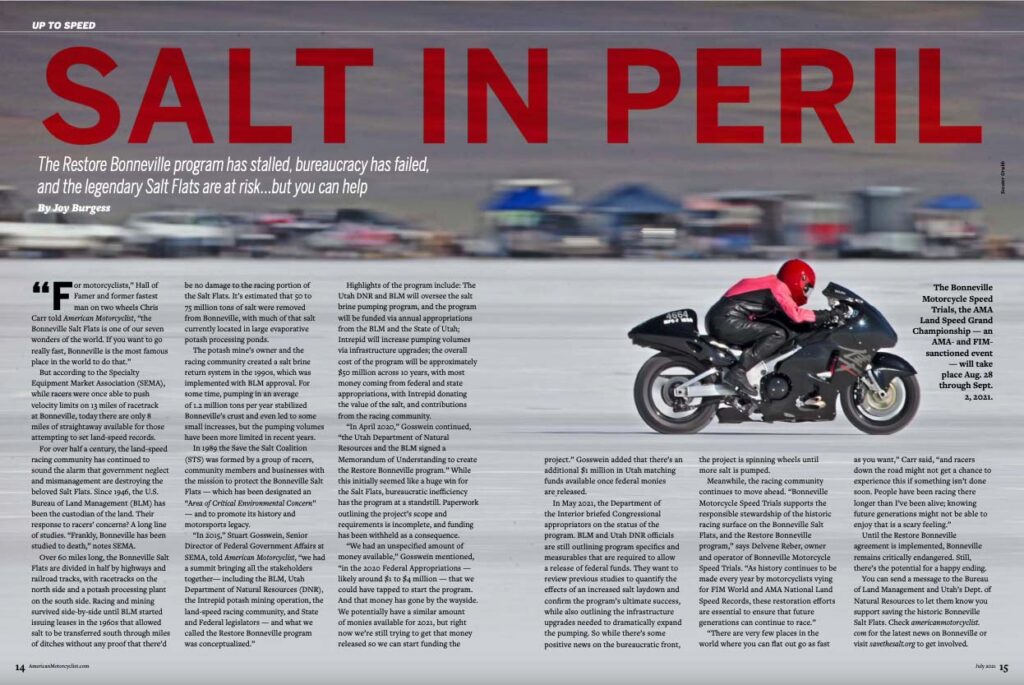Bonneville Salt Flats: Salt in Peril
The Restore Bonneville program has stalled, bureaucracy has failed, and the legendary Salt Flats are at risk…but you can help
By Joy Burgess
Photo: Scooter Grubbs
“For motorcyclists,” Hall of Famer and former fastest man on two wheels Chris Carr told American Motorcyclist, “the Bonneville Salt Flats is one of our seven wonders of the world. If you want to go really fast, Bonneville is the most famous place in the world to do that.”
But according to the Specialty Equipment Market Association (SEMA), while racers were once able to push velocity limits on 13 miles of racetrack at Bonneville, today there’s only eight miles of straightaway available for those attempting to set land-speed records.
For over half a century, the land-speed racing community has continued to sound the alarm that government neglect and mismanagement is destroying the beloved Salt Flats. Since 1946, the U.S. Bureau of Land Management (BLM) has been the custodian of the land. Their response to racers’ concerns? A long line of studies. “Frankly, Bonneville has been studied to death,” notes SEMA.
Over 60 miles long, the Bonneville Salt Flats are divided in half by highways and railroad tracks, with racetracks on the north side and a potash processing plant on the south side. Racing and mining survived side-by-side until BLM started issuing leases in the 1960s that allowed salt to be transferred south through miles of ditches without any proof that there’d be no damage to the racing portion of the Salt Flats. It’s estimated that 50 to 75 million tons of salt were removed from Bonneville, with much of that salt currently located in large evaporative potash processing ponds.
The potash mine’s owner and the racing community created a salt brine return system in the 1990s, which was implemented with BLM approval. For some time, pumping in an average of 1.2 million tons per year stabilized Bonneville’s crust and even led to some small increases, but the pumping volumes have been more limited in recent years.
In 1989 the Save the Salt Coalition (STS) was formed by a group of racers, community members and businesses with the mission to protect the Bonneville Salt Flats — which has been designated an “Area of Critical Environmental Concern” — and to promote its history and motorsports legacy.
“In 2015,” Stuart Gosswein, Senior Director of Federal Government Affairs at SEMA, told American Motorcyclist, “we had a summit bringing all the stakeholders together — including the BLM, Utah Department of Natural Resources (DNR), the Intrepid potash mining operation, the land-speed racing community, and State and Federal legislators — and what we called the Restore Bonneville program was conceptualized.”
Highlights of the program include: The Utah DNR and BLM will oversee the salt brine pumping program, and the program will be funded via annual appropriations from the BLM and the State of Utah; Intrepid will increase pumping volumes via infrastructure upgrades; the overall cost of the program will be approximately $50 million across 10 years, with most money coming from federal and state appropriations, with Intrepid donating the value of the salt, and contributions from the racing community.
“In April 2020,” Gosswein continued, “the Utah Department of Natural Resources and the BLM signed a Memorandum of Understanding to create the Restore Bonneville program.” While this initially seemed like a huge win for the Salt Flats, bureaucratic inefficiency has the program at a standstill. Paperwork outlining the project’s scope and requirements is incomplete, and funding has been withheld as a consequence.
“We had an unspecified amount of money available,” Gosswein mentioned, “in the 2020 Federal Appropriations — likely around $1 to $4 million — that we could have tapped to start the program. And that money has gone by the wayside. We potentially have a similar amount of monies available for 2021, but right now we’re still trying to get that money released so we can start funding the project.” Gosswein added that there’s an additional $1 million in Utah matching funds available once federal monies are released.
In May 2021, the Department of the Interior briefed Congressional appropriators on the status of the program. BLM and Utah DNR officials are still outlining program specifics and measurables that will allow a release of federal funds. They want to review previous studies to quantify the effects of an increased salt laydown and confirm the program’s ultimate success, while also outlining the infrastructure upgrades needed to dramatically expand the pumping. So while there’s some positive news on the bureaucratic front, the project is spinning wheels until more salt is pumped.
Meanwhile, the racing community continues to move ahead. “Bonneville Motorcycle Speed Trials supports the responsible stewardship of the historic racing surface on the Bonneville Salt Flats, and the Restore Bonneville program,” says Delvene Reber, owner and operator of Bonneville Motorcycle Speed Trials. “As history continues to be made every year by motorcyclists vying for FIM World and AMA National Land Speed Records, these restoration efforts are essential to ensure that future generations can continue to race.”
“There are very few places in the world where you can flat out go as fast as you want,” Carr said, “and racers down the road might not get a chance to experience this if something isn’t done soon. People have been racing there longer than I’ve been alive; knowing future generations might not be able to enjoy that is a scary feeling.”
Until the Restore Bonneville agreement is implemented, Bonneville remains critically endangered. Still, there’s the potential for a happy ending. You can send a message to the Bureau of Land Management and Utah’s Dept. of Natural Resources to let them know you support saving the historic Bonneville Salt Flats. Check americanmotorcyclist.com for the latest news on Bonneville or visit savethesalt.org to get involved.
NOTE: Racing continues at Bonneville…for now. The Bonneville Motorcycle Speed Trials, the AMA Land Speed Grand Championship — an AMA- and FIM-sanctioned event — will take place Aug. 28 through Sept. 2, 2021
This article first appeared in the July edition of American Motorcyclist.




